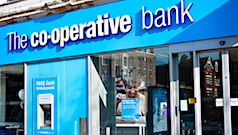Manchester-based Co-operative Bank said on Thursday its losses before tax narrowed to £135.2 million in the six months to June 30, 2017, from £177 million in the same period last year.
Current account numbers at the self-styled “ethical bank” have fallen by almost 2% — about 25,000 accounts — since December 31, 2016, to 1.4 million accounts.
The troubled bank said in June it agreed a complex £700 million rescue package with its major investors that would shore up its capital base.
Net interest margin in the first half decreased to 1.32% from 1.42% in last year’s first half “reflecting the impact of the base rate cut, coupled with changes to the bank’s funding mix, including as a reaction to deposit outflows experienced in H1 2017.”
The bank’s total Retail and Business and Commercial Banking (BaCB) customer loans decreased marginally to £15 billion as at June 30 compared to £15.3 billion at December 31.
Co-operative Bank’s Common Equity Tier 1 (CET1) ratio fell to 9.8% at June 30 from 11.0% at December 31 “mainly reflecting the statutory loss after tax of £139.7 million, partially offset by a £0.3 billion reduction in Risk Weighted Assets (RWAs) to £6.3 billion.”
The complex rescue deal proposed in June would see the Co-op Bank’s investors swapping their bondholdings for cash and shares — a move that would improve the bank’s capital levels and take them back up to a level acceptable to the UK’s financial regulators.
The bank has been hit by a number of scandals in recent years and had to be rescued by a group of hedge funds in 2013.
The hedge funds that invested in Co-op bank included Cyrus Capital Partners, GoldenTree Asset Management, BlueMountain Capital and Silver Point Capital.
Co-operative Bank CEO Liam Coleman said on Thursday: “The capital raising proposal we announced in June is progressing to plan and is currently on track to conclude by September.
“This will secure the future of The Co-operative Bank as a viable stand-alone entity with greater capital strength enabling a new phase in its turnaround.
“Against this backdrop, business performance in the first half of 2017 has been resilient.
“Customer satisfaction for the service we provide has increased and we have continued to reduce our cost base.
“Customer relationships are hugely important to us and the vast majority of customers have remained very loyal as we have progressed the sale and capital raise process and I am extremely grateful for their ongoing support.
“Of course there is more hard work ahead, and like other banks, we recognise there are risks to the UK economy, but this is a great bank and we are positive about the future …”




